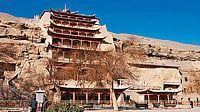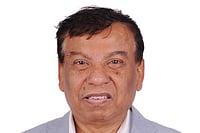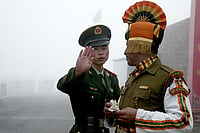The ‘politics’ of the 20th Party Congress has been settled in a manner of speaking and a kind of calm appears to be returning to China-watching the world over. Departing from the conventions of tenure and succession in place since the turn of the century, the 20th National Congress of the Communist Party of China (CPC) accorded a third five-year term to General Secretary Xi Jinping who, as expected, established his dominance and primacy in the CPC.
The surprise, generally remarked, was that there were no surprises but, ironically enough, the new set of leaders did take many crystal ball gazers by surprise and only served to enhance the sense of uncertainty that acknowledged experts have about this “black box” of Chinese elite politics. This is strongly reflected in comparisons of Xi Jinping’s leadership tactics with that of Mao’s or in explaining how ‘factions’ operate in the CPC.
Xi has made numerous references to Mao’s speeches and utterances over the past decade—as would any leader in any other country pay tribute to nation-builders of their past—and observers have commented on how he has brought a Mao-like focus to ideology within the party and in the daily life of the people in China. Furthermore, after the conclusion of the 20th Congress, the first visit of the new Politburo Standing Committee was to Yanan, in Shanxi province of northwestern China.
A major revolutionary base, Yanan was also the site of the Seventh Party Congress in 1945, after which the Mao Zedong Thought was enshrined as the guiding ideology of the Communist Party. The symbolism is unmistakable, but there are two aspects here: one tends to get unduly highlighted, while the other is often underplayed. First, Xi’s invocation of Mao is generally interpreted as heralding the return of Maoism. This is not only an unwarranted conclusion but also highly misleading, obfuscating understanding about the far-reaching transformation of Chinese politics since the 1970s.
The Yanan visit was utilised by Xi primarily to draw a parallel with the nature and seriousness of the challenges that the party and the nation are facing today and emphasise the need “to strengthen their fighting capacity… and resolutely overcome the difficulties and challenges ahead”. This was both an ideological and nationalist message – and all the messaging that the outside world seeks to extrapolate must bear in mind that the National Congress of the Communist Party is, in the first instance, the most important and defining event for the party, the people and the army in China.
The newly inducted team comprising the Standing Committee of the politburo, as has been remarked in numerous commentaries, has been closely associated with Xi for a long period of time and will be the people who Xi will depend upon to regulate the other institutions critical to the control of power in China—the Central Commission for Discipline Inspection (CCDI) and the Internal Security department. These are: Shanghai party chief Li Qiang, widely acknowledged as no. 2 in the hierarchy and the most probable candidate for the next premier; Guangdong province chief Li Xi, who will be heading the CCDI succeeding the former anti-corruption chief Zhao Leji, who is also a member of the new team; Wang Huning, who recently shot into the limelight as ‘chief advisor of Zhongnanhai’ (the CPC’s central headquarters); Beijing party chief Cai Qi; and Ding Xuexiang, another influential advisor to Xi.
Premier Li Keqiang was an expected omission, though Hu Chunhua and Wang Yang, who had earlier been in Xi’s inner circle, were not. Subsequently, the appointments to various important positions have begun, with the Propaganda Division going to Li Shulei, who had been in charge of publicity, and Shi Taifeng, the former president of the Chinese Academy of Social Sciences, entrusted with the charge of the United Front Work Department. The latter is an extremely important unit in the Central Committee of the Politburo, entrusted with the task of networking mainly with the Chinese diaspora to expand the support base of the party and promote its cause and agenda.
Xi Jinping would also be the chairman of the third critical institution, the Central Military Commission, in which three PLA generals from the Western Theatre Command, which borders India, have been promoted. A sense of the personalities to be appointed to key government posts will likely pick up momentum in the run-up to the National People’s Congress in March 2023.
For what it is worth, it may be mentioned that the 20th Central Committee has no female representation for the first time in over 25 years. This is unarguably one of the most regrettable aspects of the 20th Congress. It does no credit to a party that had operated on Mao’s injunction that “women hold up half the sky” and championed the cause of women’s emancipation. This glorious revolutionary legacy lies in tatters as an all-male bastion of power entrenches itself and further constricts women’s voices in Chinese politics.
Much ink has also been spilt on how this is a team of Xi’s ‘allies’ and staunch supporters, with absolute loyalty to Xi. However, it would be worth bearing in mind that this is also a set of people who have been brought together to steer the country through “bai nian wei you zhi da bian ju”—unprecedented (big) changes the likes of which have not been seen in a century. As the cognoscenti are aware, throughout China’s history, the Communist Party has always sought to identify the distinguishing characteristic of international relations at a particular historical juncture, which then determines the nature and direction of the specific policies to be adopted. This habit continues to be in place. In the Chinese perspective, the world is undergoing a major upheaval and there is enormous uncertainty about the kind of transformation in the world order that will come about. China is up against an entirely new set of challenges and threats. The number of times Xi mentioned ‘security’ in his report to the Congress is being seen by experts as testifying to either his paranoia, both internal and external, or to his prioritising security over growth.
It is, however, difficult to concur with these assessments on a careful perusal of the document in its entirety. For one, the references to economic growth in the context of China’s rise as a world power are mentioned in conjunction with new security threats to that very growth process. There is a whole gamut of ‘threats’ emanating from the tech-war underway between the United States and China and the U.S. sanctions, particularly in the IT sector. Given the fact, as Xi said in his report, that China’s capacity for scientific and technological innovation is not strong enough, all-out efforts will be made to “accelerate the realisation of a high level of technological self-sufficiency” and ensure “supply-chain resilience”. This speaks more about Xi’s determination to take all necessary steps to prevent the moves to thwart China’s modernisation—ensuring growth through addressing security concerns.
As the report asserted, “Mechanisms for countering foreign sanctions, interference and long-arm jurisdiction will be strengthened.” On this will depend China’s continuing growth. Thus, assessment that China under Xi is prioritising security over growth glosses over this vital organic link between security and growth. It is also necessary to bear in mind the backdrop in which the 20th Congress took place. The contrast with the upbeat mood in 2017, when Xi secured his second term, and the more sombre atmosphere of 2022 could not be greater, viz, the economic downturn and related issues, the social tensions due to the zero-Covid policy, the fallout of natural disasters in the
domestic context and the sharp rise of geopolitical challenges in China’s external sphere following the Ukraine war. Finally, the strategic challenge from the United States has acquired an overt edge and will continue to be the primary focus of China.
The attention of the China-watchers once again seems to be coming back to familiar tropes of western capitalist discourse about China: pessimistic prognostications about the future of the state-dominated Chinese economy and the gloomy outlook for democracy in China. There is, on the other hand, a profusion of writings which make a fair case for a more optimistic scenario. The fact is that despite the talk of ‘decoupling’ from China, there is as yet no concrete evidence in that regard; China’s manufacturing prowess has not diminished despite the pandemic and, in fact, countries like India and Australia, which had been hailed as possible alternatives, continue to rely on Chinese manufacturers. China has begun to mark its presence in both the high and the lower ends of the technology scale as trade flows will testify and while the zero-Covid policy, the property bubble and employment will test the new leadership, the doomsday scenarios do not appear to be materialising very soon.

The 20th Congress saw Xi placing the achievements of the past years and the tasks for the future as the foundational basis of his leadership, authority and prestige. There was neither an overdose of celebration nor any lack of assertion of the accomplishments; rather the overall tone was sobre, reflected in his statement that China should watch out for “high winds, choppy waters or even dangerous storms” and be prepared “like a student sitting for a never-ending exam”.
In many ways, the overall agenda, the goals, and objectives—doubling the size of the nation’s economy by 2035—the iteration of the challenges in the next quinquennial seem to be also seeking to bring about a broad, and ‘new’ consensus for the ‘new era’ within the party. That would explain Xi’s call for “unity of thought, unity of will, unity of programme, unity of action” to bring about “national rejuvenation” and give concrete shape to the China Dream. The CPC’s agenda above all is an agenda for nation-building under the party leadership. Priority is thus accorded to strengthening the Party and unifying the leadership; building a moderately prosperous society by abolishing poverty and ushering in an era of new development philosophy; advancing socialist culture while enhancing ecological conservation; diffusing risks along with ensuring social stability; and managing the pandemic with the approach that “lives, above all, mattered”.
While his critics have assessed Xi’s anti-corruption drives as purging campaigns aimed at his opponents, they have resonated well with the ordinary people. The tightening of state controls on the private economy—a hallmark of Xi’s policy to reduce the inequities in Chinese society—is intended to garner broad support not only from the more marginalised and poorer sections but also from those whose fortunes have seen a sharp downturn during the pandemic. It would certainly add to his ‘quanwei’ (authority and prestige), an interesting cultural aspect highlighted by some Chinese scholars as more important than the formality of titles—though that is not being discounted. The western obsession with capitalism as the only route to establishing a market economy fails to take on board the range of options being explored by the post-Mao leadership—and now Xi in his ‘New Era’—in its quest for regaining economic dominance. Dealing with the dubious status of being one of the most unequal societies in the world would likely be of greater consequence for Xi, than the response of the western capitalists to the clamping down on the private sector of the economy. The greatest asset of the party, as Xi pointed out, was “self-reform” – only this would help China “escape the historical cycle of rise and fall.”
‘Ideology’, and politics, of one kind or the other has shaped China since its inception. However unacceptable or problematic it may be to the observer, it cannot be sidestepped in China—it is never a useful way to grasp the CPC-led changes in all their complexity. The issue is what kind of politics and ideological framework. ‘Xi Jinping’s Thought on Socialism with Chinese Characteristics for a New Era’ (2012–2022, the Era of Xi Jinping) had already been incorporated in the Party Constitution during the 19th Party Congress and is now the third major component in the ideological corpus of the CPC. There are certainly new ideas and new policies—a whole new economic and political lexicon has evolved over the past decade—and it is necessary to engage with that. Xi has made it clear that without the CPC, China’s tryst with its destiny would fail to materialise. In that sense, there is more continuity to be seen here—the Four Cardinal Principles of Deng very firmly underscored the leadership of the CPC, the goal of a socialist society and the guidance of Marxism–Leninism Mao Zedong Thought.
To be sure, the casualty in the last decade has been collective leadership and the lack of accommodation of differing voices in the ruling elite. Xi could hardly be unaware of the lessons of history in this regard. But in his view—and clearly there would have to be a fair degree of support within the Communist Party in this regard as well—the domestic and international situation that China finds itself in today warrants a strong leader.
China is a huge country, with many complexities, multiple realities and a multi-layered society. It is not that the CPC does not have mechanisms to incorporate different perspectives. A strong Centre would have to not only work towards uniting the diverse forces behind the next stage of reforms but also rein in the errant provinces in line with the central policies for more effective implementation. Xi Jinping has set the stage for a tightly controlled, CPC-led, China’s march into the next phase of its rise in the 21st century.
“China cannot develop in isolation from the world,” Xi said, flanked by the others on the new leadership team. “The world’s development also needs China.”
(This appeared in the print edition as "More Power to the Leader")
(Views expressed are personal)
Alka Acharya is a Professor at the JNU and an Hon Director at the the INstitute of Chinese Studies

























